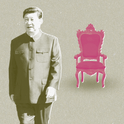In the May issue of Prospect, Richard Dowden argued that the international criminal court's (ICC) approach to justice in northern Uganda was hindering the chances of a sustainable peace deal between the government and the rebel Lord's Resistance Army (LRA). The dilemma is a genuine one, but it is worth adding that coverage of the Uganda situation has often been framed in simple "peace vs justice" terms. This "boxing match" terminology is more hindrance than help. Rather than polarise the debate further, it is more useful to consider how different approaches at different levels, at different times and by different institutions can address the challenges of mass crimes in complementary ways.
In Uganda, the ICC is now directly confronting a question many believed was inevitable: will it continue prosecuting serious crimes if it becomes an obstacle to peace? Having issued indictments against the LRA commanders in October 2005, the court still has none of them in custody. Although he initially referred the LRA cases to the ICC, Uganda's President Museveni then proposed amnesties for the commanders instead, to encourage the LRA to talk peace. The ICC warrants can't simply be withdrawn, however, and options are now being explored for a compromise whereby the Ugandan courts rather than the ICC would take up the baton and proceed with what may be watered-down charges.
The ICC has further headaches in the two other situations it is investigating. In Sudan, peace and justice tensions also loom and the court confronts the challenge of how, without independent muscle, it is going to apprehend Darfur war crimes suspects (one of whom is in the government) when the Sudanese administration rejects the court entirely. In the Democratic Republic of Congo, the ICC's first suspect has been transferred to The Hague, but the court has been criticised for pursuing a fairly lowly warlord while worse offenders now enjoy government positions.
Several factors help explain why debates surrounding the ICC are so heated. First, the ICC can only investigate crimes committed after July 2002, which means it is inevitably drawn into active conflict situations. Second, the fierce battle over the creation of the court, only a few years old, means that those who were opposed to it from the outset are keen to see it fail while its supporters are anxious for it to "get results." Expectations have often been unreasonably high, and the court itself has fluctuated between modest and grand proclamations of what it can achieve. Third, the clustering of ICC cases in Africa invites inherently vexed issues of sovereignty and outsider intervention. Fourth, doubts over the effectiveness of international justice abounded even before the ICC was established. The ad hoc tribunals in Rwanda and the former Yugoslavia have been expensive, slow and detached from the concerns of affected populations.
Debates framed as "peace vs justice" belie the complexity of the issues. The two can work in tandem under certain circumstances, and in opposition at others. In Uganda, justice and peace may have initially been positively linked, as the threat of ICC prosecution helped drive the LRA to the negotiating table.
A further false dichotomy is that between "western" retributive criminal justice and "African" restorative justice. Both are often romanticised. On the one hand, pristine international justice is spoken of as if it can somehow transcend the compromised realm of domestic politics. On the other, local processes can be oversold as embodying traditional values and as innately attuned to victims' needs. Local politics always impinges on international justice, and the ICC has so far failed to grasp the complex political dynamics surrounding the Uganda peace talks. Local responses to atrocities also have real limitations. There is no inherently reconciliatory "African" way of addressing mass crimes: opinions are mixed in northern Uganda over the legitimacy of local reconciliation rituals, which have been proposed as a potential response to crimes, and how far they are appropriate for dealing with perpetrators.
Underlying these debates are fundamental questions about what, and who, international justice is for. Is it an end in itself or a means to peace or reconciliation? Is it for the victims or, as Dowden suggests, simply a salve for the consciences of the international community that failed to halt the crimes in the first place? How far should the ICC go towards building the capacity of domestic justice institutions rather than focusing on its own cases? The ICC is still defining its role and revising down expectations. In Uganda, it initially proclaimed it could help end the 20-year conflict in six months, but it then got bogged down and softened its rhetoric, arguing instead that justice was necessary simply to give the rebel leaders what they deserved for their crimes and to undermine Uganda's culture of impunity.
So how can the ICC cut through these dilemmas? There is no magic bullet, but one way forward is for the court to reaffirm and heed an essential principle: "complementarity." According to the Rome statute, the ICC's governing document, complementarity dictates that the ICC can prosecute crimes only when justice cannot be delivered domestically; that is, when national jurisdictions are unwilling or unable to prosecute crimes. The ICC should act as a back-up to local jurisdictions.
The principle of complementarity also highlights that there is often a role for both international and local institutions in responding to mass atrocities. In many cases, the ICC should prosecute serious crimes committed by government, military or militia leaders who can easily manipulate domestic institutions and thus escape justice. Local processes, on the other hand, can often hold lower-level perpetrators accountable and help facilitate reconciliation in fractured communities. The key therefore is not to choose between international and local institutions, between retribution and reconciliation, but to co-ordinate and to sequence these different processes. If peace can be achieved in Uganda (a big if), it is imperative to balance the ICC, the national courts and community-based reconciliation processes. So far, the ICC has paid only lip service to complementarity, and has neglected to build relationships with local actors. The ICC is a crucial option in states without viable domestic responses to mass atrocities. But until the court clarifies its role, it will continually face the sorts of problems that have bedevilled it in Uganda and elsewhere.











